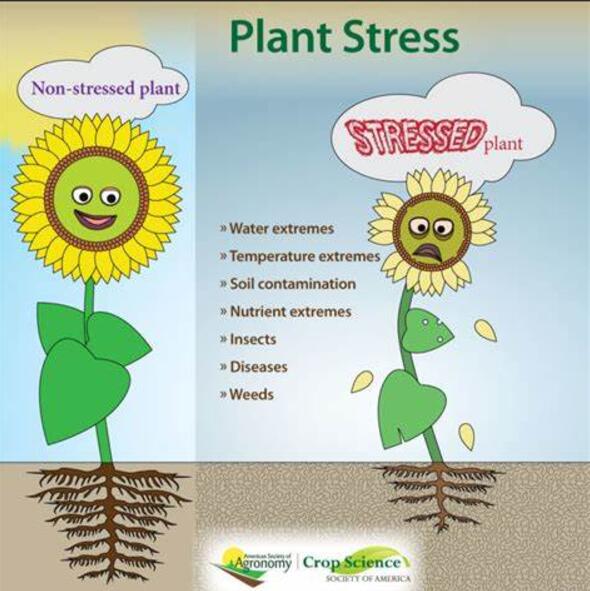GhSPDS11上调棉花亚精胺合成酶对碱耐受性的响应
IF 6.8
Q1 PLANT SCIENCES
引用次数: 0
摘要
碱性胁迫会造成显著的不良影响,减缓植物生长,降低作物产量;因此,这是棉花种植的一个重大挑战。亚精胺(Spd)是一种重要的多胺,在增强植物对多种非生物胁迫的抗性中起着重要作用。然而,目前对亚精胺合成酶(SPDS)在棉花耐碱性胁迫中的作用及其生物合成的分子机制还知之甚少。本研究对4个代表性棉花品种(Gossypium spp.)的spds相关基因进行了系统的比较分析,并通过启动子顺式作用元件分析对spds相关基因进行了初步的功能表征。利用病毒诱导的基因沉默(VIGS)来破坏ghspds11介导的Spd生物合成。在碱性胁迫下,ghspds11沉默的幼苗超氧化物歧化酶(SOD)和过氧化氢酶(CAT)活性分别降低29.14%和11.12%,可溶性糖和脯氨酸(Pro)含量分别降低31.57%和15.16%,丙二醛(MDA)和过氧化氢(h2o2)含量分别增加42.38%和38.66%。与此同时,沉默植株开放气孔减少44.87%,Spd含量、相对含水量和生物量显著下降。这些结果表明,由GhSPDS11组成的Spd在提高棉花耐碱性方面具有重要作用。本研究为棉花耐盐碱土壤的分子过程提供了良好的信息,并且GhSPDS11可能是棉花在这种恶劣农业气候条件下改良的良好遗传靶点。本文章由计算机程序翻译,如有差异,请以英文原文为准。
GhSPDS11 up-regulated spermidine synthase responding to alkaline tolerance in cotton
Alkaline stress causes significant adverse effects that slows down the growth of plants and lowers the yield of crops; hence, it is a major challenge in cotton farming. Spermidine (Spd), a vital polyamine, plays a significant role in enhancing plant resistance to stress caused by various abiotic factors. The molecular mechanism of Spd biosynthesis and especially the role of spermidine synthase (SPDS) in tolerance of alkaline stress in cotton is, however, little known. In this study, a systematic comparative analysis of SPDS-associated genes was performed across four representative cotton cultivars (Gossypium spp.), followed by preliminary functional characterization through promoter cis-acting element profiling. Virus-induced gene silencing (VIGS) was utilized to disrupt GhSPDS11-mediated Spd biosynthesis. Under alkaline stress, GhSPDS11-silenced seedlings exhibited 29.14% and 11.12% reductions in superoxide dismutase (SOD) and catalase (CAT) activities, 31.57% and 15.16% decreases in soluble sugar and proline (Pro) content, along with 42.38% and 38.66% increases in malondialdehyde (MDA) and hydrogen peroxide (H₂O₂) compared to controls. Concurrently, silenced plants showed 44.87% fewer open stomata and significant declines in Spd content, relative water content, and biomass. These results indicate the key importance of Spd, which is composed of GhSPDS11, in improving alkali tolerance in cotton. This research gives good information regarding the molecular processes that take part in the tolerance of cotton to the saline-alkaline soils, and that GhSPDS11 could be a good genetic target in cotton enhancement in this tough agro-climatic condition.
求助全文
通过发布文献求助,成功后即可免费获取论文全文。
去求助
来源期刊

Plant Stress
PLANT SCIENCES-
CiteScore
5.20
自引率
8.00%
发文量
76
审稿时长
63 days
期刊介绍:
The journal Plant Stress deals with plant (or other photoautotrophs, such as algae, cyanobacteria and lichens) responses to abiotic and biotic stress factors that can result in limited growth and productivity. Such responses can be analyzed and described at a physiological, biochemical and molecular level. Experimental approaches/technologies aiming to improve growth and productivity with a potential for downstream validation under stress conditions will also be considered. Both fundamental and applied research manuscripts are welcome, provided that clear mechanistic hypotheses are made and descriptive approaches are avoided. In addition, high-quality review articles will also be considered, provided they follow a critical approach and stimulate thought for future research avenues.
Plant Stress welcomes high-quality manuscripts related (but not limited) to interactions between plants and:
Lack of water (drought) and excess (flooding),
Salinity stress,
Elevated temperature and/or low temperature (chilling and freezing),
Hypoxia and/or anoxia,
Mineral nutrient excess and/or deficiency,
Heavy metals and/or metalloids,
Plant priming (chemical, biological, physiological, nanomaterial, biostimulant) approaches for improved stress protection,
Viral, phytoplasma, bacterial and fungal plant-pathogen interactions.
The journal welcomes basic and applied research articles, as well as review articles and short communications. All submitted manuscripts will be subject to a thorough peer-reviewing process.
 求助内容:
求助内容: 应助结果提醒方式:
应助结果提醒方式:


